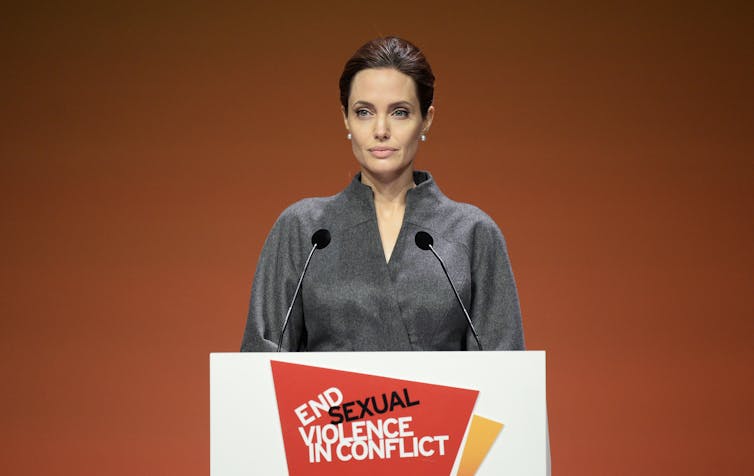Bringing perpetrators of sexual violence to justice is extremely difficult, especially in conflict zones. One in three women experience such violence, according to the World Health Organization, but perpetrators are rarely brought to justice.
The suffering caused by sexual violence is compounded for women and girls in developing countries and in rural communities affected by conflict, where prosecutions are even more difficult.
According to our research, if more perpetrators are to be successfully prosecuted, we must get better at collecting evidence in sexual violence cases. And the voice of survivors must be heard by those who make policies to tackle sexual violence.
The Preventing Sexual Violence in Conflict Initiative (PSVI) is one of the most rigorous international efforts to date to end impunity. It was launched in 2012 and led by the UK Foreign and Commonwealth Office (FCO). At a PSVI global summit in 2014, leaders from around the world committed to take action to end sexual violence in conflict.
At the summit, the PSVI also launched the International Protocol on the Documentation and Investigation of Sexual Violence in Conflict, which sets out the legal elements for establishing sexual violence as a weapon of war. The protocol also provides guidance on how to conduct interviews with victims and witnesses to get testimonial evidence to support investigations and prosecutions.

Falling short
The UK’s Independent Commission for Aid Impact (ICAI) recently gave the PSVI an amber-red rating for its overall effectiveness. The ICAI said while the initiative was “an important body of work on a neglected topic”, the UK government did not take practical action on pledges that had been made and so “fell short of the government’s stated ambitions”. Perhaps most worrying, the commission concluded that while the PSVI had appointed “survivor champions”, survivors were not meaningfully included in the choice, design and implementation of its programme.
The FCO was due to tackle this concern at the latest PSVI conference in late 2019, but it was postponed because of the UK election.
However, the ICAI applauded the international protocol as one of the PSVI’s achievements. It found the protocol is being used in 16% of the justice and accountability programmes it reviewed, including in Bosnia and Herzegovina, Burma, Colombia, the Democratic Republic of Congo, Syria, Uganda and Iraq.
Our recent research reveals the significant role the protocol plays in supporting prosecutions. It outlines legal requirements for establishing sexual violence as a crime against humanity, and evidence-based interview techniques for obtaining testimonies to support prosecutions.
But the organisations that need this information the most don’t have the capacity to use the protocol. This became clear when we consulted with the FCO on the revision of the protocol before its publication in 2017. The knowledge base on which the protocol relies was also developed largely with criminal investigators in mind, and its usefulness in developing countries with non-specialist interviewers is unproven.
Not available at the grassroots
One of us (Wangu Kanja) is also the executive director of a foundation that works with survivors of sexual violence in Kenya, and the convener of a network of survivors in the country that helps them get justice. But we’ve seen first-hand that little has changed for survivors seeking justice in Kenya since the global summit and the introduction of the protocol.
The job of helping affected communities largely falls to grassroots organisations, including local charities and survivor networks. We’ve shown that understanding the varied contexts in which these organisations operate is vital to develop the tools that are needed to investigate, document and prosecute sexual violence cases.
Although forensic science can play a key role in the investigation and prosecution of sexual violence cases, there is limited capacity for using it in innovative ways in developing countries. In response to these challenges, our current research is testing novel DNA recovery kits that could recover and preserve valuable evidence where medical and forensic examinations aren’t available.
Involving survivors
Another challenge we’ve identified is a shortfall in training non-specialist interviewers to document sexual violence. Our ongoing research is investigating whether vastly improved evidence, in survey completion rates and data accuracy, can be obtained by survivors of sexual violence who have been trained as interviewers. They are trusted by their communities and can build empathy based on their shared experiences.
Identifying the limitations of the protocol in collaboration with these survivors can shed light on the realities that need to be addressed. In an effort to build this knowledge, the Wangu Kanja Foundation has partnered to develop an app that lets survivors of sexual violence in Kenya report, document and track cases.
This knowledge is patchy at best in many developing countries, such as Kenya, partly due to the under reporting of these violations. Victims who report violence are sometimes killed in the belief it will preserve their family honour. Survivors also encounter discrimination and hostility within the criminal justice system due to attitudes, beliefs and values held by the police and other officials who condone sexual violence.
Unless we also learn from survivors of sexual violence and grassroots organisations, we may miss critical information on improving the delivery of justice.

